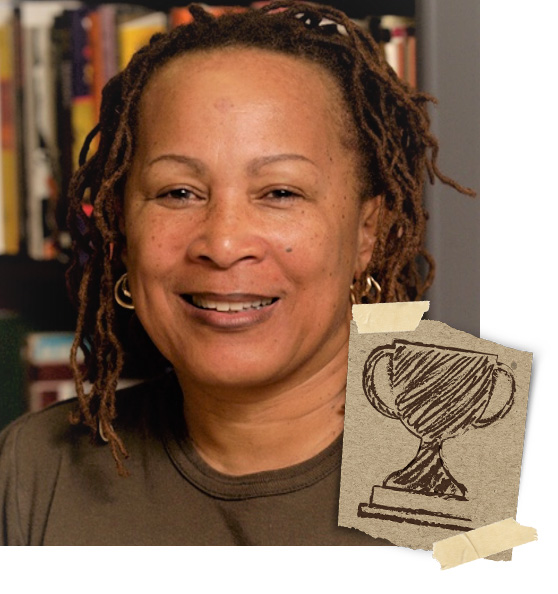Diversity Champion: Dr. Jualynne E. Dodson
February 24, 2022 - Liz Schondelmayer and Jualynne Dodson
World-renowned sociologist Jualynne E. Dodson is Professor Emeritus in the Michigan State University College of Social Science. A celebrated author, lecturer, researcher and mentor - as well as an integral part of MSU's campus for over 20 years - Dr. Dodson originally came to East Lansing in 2001 as a John A. Hannah Distinguished Visiting Professor.
 Before arriving at MSU, Dr. Dodson served in a variety of leadership roles at prestigious colleges and universities, such as the Atlanta University School of Social Work, Yale University, New York City’s Union Theological Seminary, Bates College of Lewiston, Maine and the University of Colorado-Boulder. At the latter, she founded the African Atlantic Research Team (AART), a mentoring collective that advises and guides domestic students of color throughout their journey in higher education.
Before arriving at MSU, Dr. Dodson served in a variety of leadership roles at prestigious colleges and universities, such as the Atlanta University School of Social Work, Yale University, New York City’s Union Theological Seminary, Bates College of Lewiston, Maine and the University of Colorado-Boulder. At the latter, she founded the African Atlantic Research Team (AART), a mentoring collective that advises and guides domestic students of color throughout their journey in higher education.
Throughout her career, Dodson has mentored over 75 students of color to a degree completion, providing direction and cultural grounding while helping them thrive as they navigate academic Bachelors, Masters and/or PhD programs.
"It's been wonderful to watch students and our African Atlantic Research Team receive multiple distinguished academic accolades; the MSU King-Chávez-Parks Future Faculty Fellowship Program, the London, England Marshall Scholarship, as well as invited membership in Phi Beta Kappa, to name a few."
Passionate about helping students succeed, Dr. Dodson also teaches multiple graduate and undergraduate-level courses in the Department of Sociology. Some of her favorite classes to lead are Classical Sociological Theory, Social Movements: Modern Civil Rights and Developing Societies: Cuba.
"In every class, I do NOT begin with the assumption that I am a 'teacher,' but instead that I 'profess knowledge' - knowledge that I have acquired through research," Dr. Dodson explained. "This grounding of my professional identity allows me to develop course materials that put students in a posture of acquiring new knowledge that expands their understanding of humankind as a single species among millions of others on this earth."
Dodson's philosophy about human learning is also reflected in her research. A scholar of human cultures, religions and social structures, Dr. Dodson's career was launched in 1990 when she was awarded the National Science Foundation’s Postdoctoral Ford Fellowship after earning her PhD in Sociology of Religion from the University of California, Berkeley.
“That Ford fellowship not only included membership in a select group of distinguished research-scholars but, after accepting a tenure-track position, it also provided an additional year of external funding for new investigative travel and writing," Dodson recalls. "This was crucial because methodologically, I conduct on-site, longue durée, qualitative sociological research."
Dr. Dodson's early career research centered on the role of women within the African Methodist Episcopal (AME) Church - the world's oldest and largest centrally organized African American denomination.
"I was interested in how, when and why women did not abandon their struggle to be fully incorporated into administrative and clergy structures of their Church," Dodson said. She published a book from the work, Engendering Church: Women, Power, and the AME Church .
"Findings from the research took me to Cuba, where I began asking where, why, and how African descendants also had participated in social changes of that nation, just as descendants participated in early formation of the U.S. and built the AME Church. The Cuba findings led me to issues of that island’s African descendants, and those in other locations of the Americas, who continue practicing Africa-inspired religious traditions. It also clarified that 'University Research, Teaching, and Writing' was my vocation, not administrative work."
For the next 25 years, Dr. Dodson continued working in Cuba, investigating human’s religious behaviors as well as training undergraduate and graduate students to conduct qualitative sociological research. A main focus of her recent research has been understanding how and why practitioners of Africa-inspired religious traditions continue the beliefs and practices despite more than four centuries of separation from the continent and racism’s ever-present existence against African descendants throughout the world.
While all of her research is extremely meaningful to Dr. Dodson, research she conducted in Oriente, Cuba for her 2008 book, Sacred Traditions and Religious Traditions in Oriente Cuba , stands out as especially significant.
"That research project demonstrated that C. W. Mills’ concept of the 'sociological imagination' continues to be a valuable investigative tool for comprehending human groups' non-Eurocentric behaviors to bring about social change," Dodson explained. "That was a major finding, even over and above identifying that African descendants continue to hold an identity grounded in their continental origins, despite the racism of social forces operating to the contrary."
On top of all roles Dr. Dodson assumes at MSU, she also is a mother. Her daughter, Alyce Emory currently is an Independent Events Producer in New York City. "It's been a major highlight of my life to watch and guide my daughter through her professional journey as she returned to complete her university education, identified and became active in a career field that gives her pleasure and satisfaction, and became comfortable with her gender identity."
Finally, Dr. Dodson gives insight into how each of us can work to build more equitable environments for everyone in our everyday lives: "Always, always engage people not of your cultural background with acceptance instead of negative comparisons," she said.
"To practice anti-racism in any year requires accepting that racism exists as intentionally built into every social structure of our society and that it is manifested through individuals consciously or unconsciously wishing to enhance their personal ideas and/or social relations. With that, we are ready to change the vicious circle."

